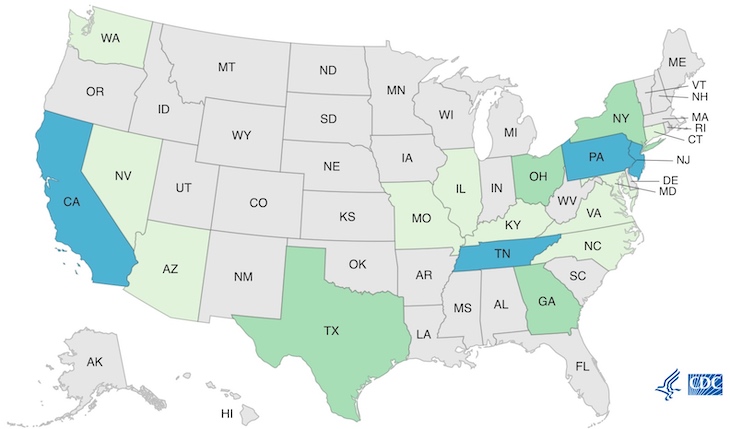The small turtle Salmonella outbreak has sickened at least 59 people in 18 states, and has hospitalized 23 of those patients, according to the Centers for Disease Control and Prevention (CDC). That is an increase of 33 more illnesses, 14 new hospitalizations, and seven more states since the last update was issued on August 25, 2023. In addition, another serotype, Salmonella Poona, has been added.

It is illegal to sell or buy turtles with shells less than four inches long in the United States. A federal law was passed because these animals have caused many illnesses, particularly in young children. Yet these turtles are found for sale in pet stores, and are for sale on line, at flea markets, or at roadside stands.
These turtles excrete Salmonella in their feces even if they look healthy and clean. The bacteria spreads to tank water and anything in the environment where they live and roam. People get sick from touching a turtle or anything in their environment, then eating or touching their mouths without washing their hands.
The case count by state is: Washington (2), Virginia (2), Texas (3), Tennessee (7), Pennsylvania (10), Ohio (3), New York (4), Nevada (1), New Jersey (6), North Carolina (2), Missouri (1), Maryland (2), Kentucky (2), Illinois (2), Georgia (3), Connecticut (1), California (6), and Arizona (2). The patient age range is from less than one year to 90 years. The median age is seven, and 39% of the patients are under the age of five.
The serotypes in this outbreak include Salmonella Stanley, Salmonella Pomona, and Salmonella Poona. In interviews with public health officials, 45 of the patients said they had contact with pet turtles before they got sick. Of the 26 people who reported the size of the turtle, all of them said the animals were less than four inches long.
People reporting to public health officials said they bought the turtles form online retailers, from stores, from roadside stands or flea markets, from a reptile show, swap meet, winning the turtle at a carnival, finding the turtle in a park, or receiving it as a gift.
Whole genome sequencing showed that bacteria from sick person’s samples are closely related genetically, which means that patients got sick from contact with the same type of animal. Bacteria from this outbreak of the serotypes Stanley and Pomona are closely related to a previous outbreak.
In August 2023, samples were collected from a patient’s turtle in Washington state. That turtle was purchased at a flea market. Whole genome sequencing showed that the Salmonella Poona from the turtle and its environment is closely related to the bacteria from sick people.
If you are thinking of getting a pet turtle, do not buy any with shells less than four inches long. Only buy them from a reputable pet store. All pet turtles, including those with shells longer than four inches, are not recommended for children under the age of five, adults aged 65 and older, or anyone with a chronic illness or compromised immune system. Those people are more likely to develop serious complications from a Salmonella infection.
Always wash your hands thoroughly with soap and water after handling turtles and touching their environment. Don’t kiss or snuggle the turtle, and don’t eat or drink around it. Keep cleaning materials you use for the turtles environment separate from other materials. And don’t clean any turtle paraphernalia in the kitchen sink; use a laundry sink or the bathtub. Clean the laundry sink and bathtub when you are finished.




